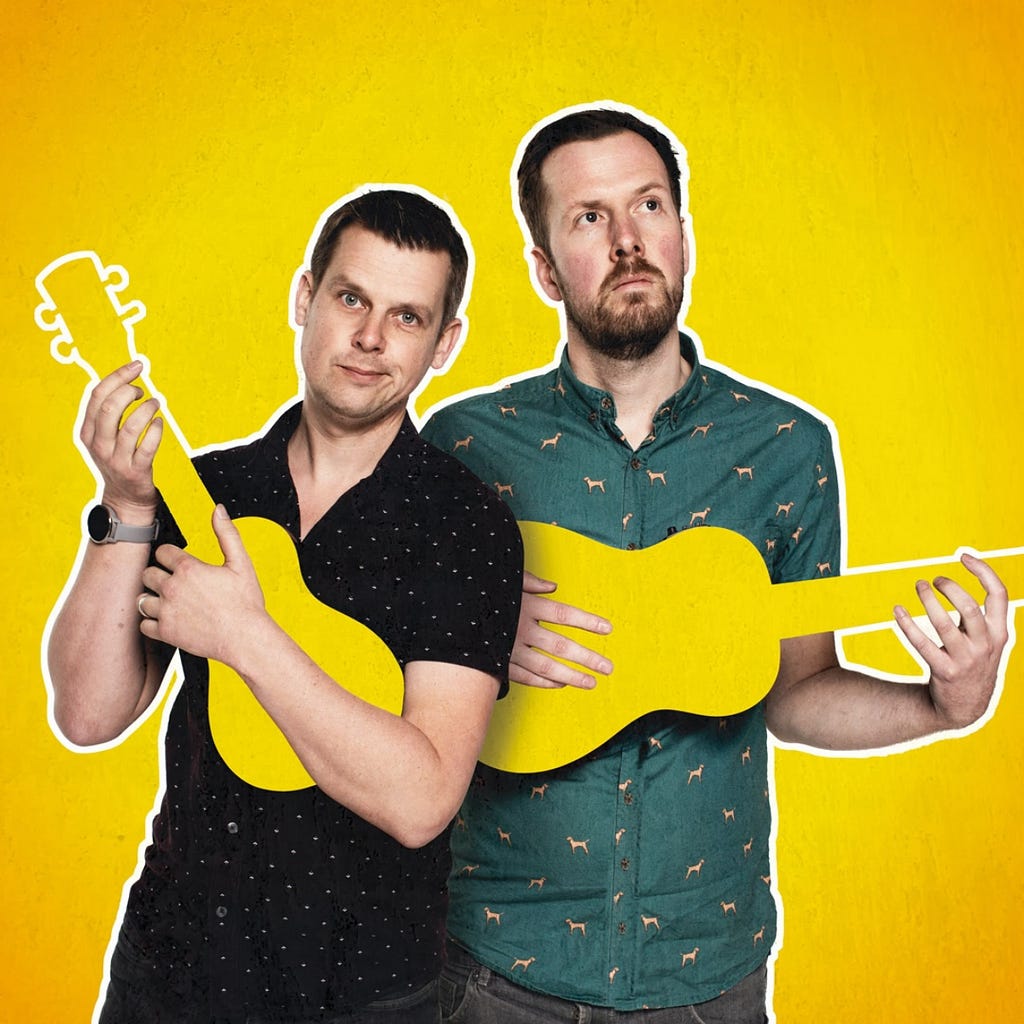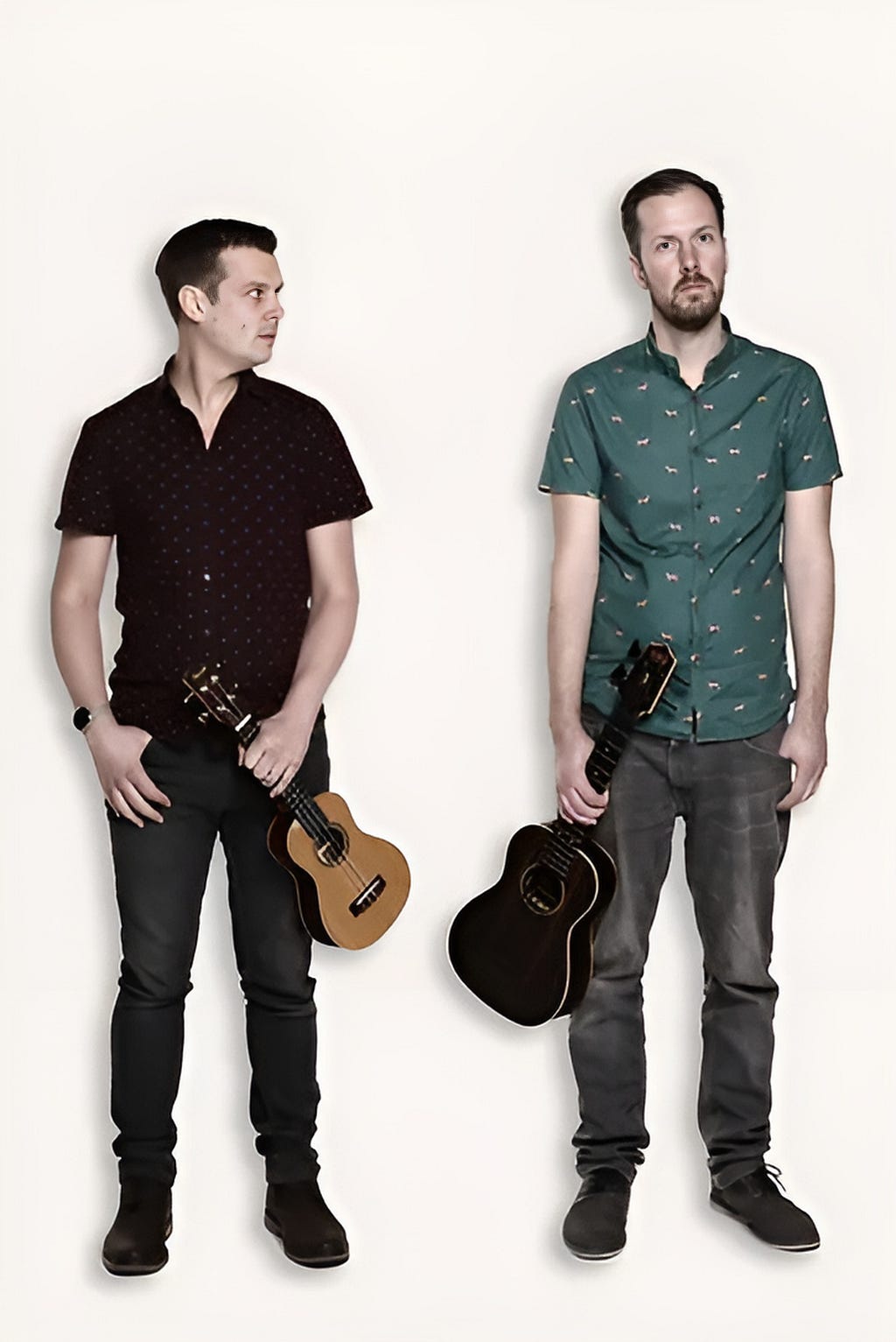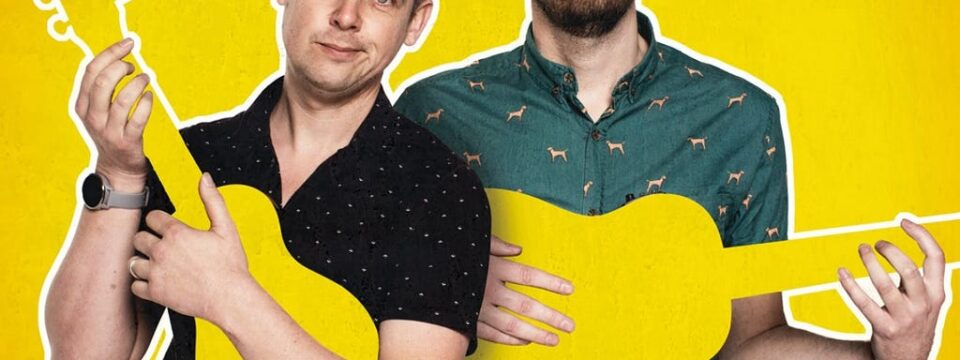Simon & Aarom of Plastic Jeezus: Five Things I Wish Someone Told Me When I First Became A Professional Comedian

Failure is all part of the journey. No professional comedian is still doing the first set they wrote. You get up and do what you think is funny, then take some time to assess it: what got laughs, what didn’t get laughs. If something didn’t get a laugh ask yourself, why not? Was it not clear enough? Was it just not very funny? Constantly revisit and hone your jokes. That way you’ll only get better and better and start enjoying it even more.
As a part of our series called “Five Things I Wish Someone Told Me When I First Became A Professional Comedian”, I had the distinct pleasure of interviewing Simon & Aarom of Plastic Jeezus.
Winners of ‘South Coast Comedian of the Year’ (2022), British Comedian of the Year Semi-Finalist, ‘Best Newcomer’ at the Musical Comedy Awards (2021), and ‘Circuit Breakers’ at Leicester Comedy Festival (2022), Simon and Aaron are Plastic Jeezus, a deadpan musical comedy duo performing side-splittingly surreal and unique original songs.
The Bournemouth-based pair’s comedy turns the serious business of making music on its head, busting through genres and teaming them with observational comedy. Tracks like ‘Hold Music’ are set to become future classics, alongside the hilarious ‘My Angle (A Lovesong, Autocorrected)’ and earworm single ‘E For Effort’. The music is interspersed with Simon & Aaron’s hilariously quirky leftfield humour, keeping audiences in stitches, and leaving us all wondering what it’s like inside their wonderfully imaginative heads.
Plastic Jeezus have rapidly built up an incredible reputation as a live act, storming comedy clubs across the UK. They have played alongside some of the most exciting acts in the UK, including Seann Walsh, Marcus Brigstocke, Ed Byrne, and Angela Barnes. The duo has performed at clubs including Brighton Komedia, York Barbican, and Comedy All Stars, as well as festival shows in Hastings, Brighton, and Shaftesbury and a sell-out Leicester Comedy Festival show. Their popular TikTok live video has over 130k views.
Thank you so much for doing this with us! Our readers would love to get to know you a bit better. Can you tell us the story of how you grew up?
Simon: I grew up in a small but friendly suburb of Bournemouth on the South Coast. It was a painfully uneventful 80s upbringing, surrounded by bad haircuts and questionable fashion choices.
Aaron: I was born in Boston (not the cool one in America) and grew up in a nearby town in Lincolnshire. There’s not much around in Lincolnshire other than fields of cauliflowers and other assorted vegetables. It was a pretty normal small-town childhood, I suppose.
Can you share a story with us about what brought you to this specific career path as a comedian?
Simon: I’ve always enjoyed making people laugh, especially if I can do it with a straight face. One of the first videos I remember watching over and over was Jack Dee’s ‘Live at the Duke of York’s Theatre’. I can still remember large chunks of it. I loved — and still love — his ability to show apparent disdain for an audience while saying hilarious things. So, as I got older and joined bands, I always enjoyed trying to make the audience laugh. It just sort of snowballed from there.
Aaron: Stand-up comedy has always fascinated me and been a bit of a mystery in terms of how to even start doing it (probably a small town symptom). I initially joined PJ as a bass player, so I suppose I got into comedy by accident. Needless to say, once we booked our first comedy gig (I didn’t write any of that first set), I became even more fascinated and started listening to podcasts and reading books on the “science” of it.
Can you tell us the most interesting story that happened to you since you began your career?
We once played a show at a campsite. It was fairly unremarkable until a bunch of children, aged maybe 7 or 8, started heckling us. They were yelling seemingly random things at us in between songs and even in the middle of songs. They were relentless. Most comedians have set responses to being heckled, but I think it’s fair to say not many of them are effective or appropriate when it comes to a group of sugar-crazed primary school children. Is that the most interesting thing that’s happened to us? Probably not, but it’s the one that immediately springs to mind, and it’s the one I still wake up in a cold sweat about.
I has been said that our mistakes can be our greatest teachers. Can you share a story about the funniest mistake you made when you were first starting? Can you tell us what lesson you learned from that?
It’s not from when we were starting out, but it’s quite recent. We were trying out some new material at a show, and we’d ummed and ahhed about how to end the last song in our set. We thought it might be funny to make it hugely anticlimactic and not play the last chord, so we tried it. We reached the end of the song — there was a bit of a crescendo — and then we walked offstage without playing the last chord. We thought it might be a bit cheeky and funny, but everyone in the room just seemed baffled. The whole set ended with an uncomfortable silence, and the audience shuffled awkwardly in their seats, trying to work out what had just happened. Not one of our best ideas. The lesson we learnt was fairly self-explanatory: make sure the set finishes on a high, not a low. Which seems obvious, really, doesn’t it?
None of us are able to achieve success without some help along the way. Is there a particular person who you are grateful towards who helped get you to where you are? Can you share a story about that?
Simon: James Alderson is a great promoter who very kindly awarded us ‘South Coast Comedians of the Year’ even though we didn’t really know what we were doing. Subsequently he booked us for loads of gigs with a bunch of our comedy heroes. We’re very grateful for that.
Aaron: And Geoff Rowe from the Leicester Comedy Festival took a punt on us very early on and has been championing us ever since. Sometimes we feel like we’ve accidentally stumbled into comedy, but it’s gratifying and reassuring when you get support from people who actually know what they’re talking about.
You have been blessed with great success in a career path that can be challenging. Do you have any words of advice for others who may want to embark on this career path, but seem daunted by the prospect of failure?
Failure is all part of the journey. No professional comedian is still doing the first set they wrote. You get up and do what you think is funny, then take some time to assess it: what got laughs, what didn’t get laughs. If something didn’t get a laugh ask yourself, why not? Was it not clear enough? Was it just not very funny? Constantly revisit and hone your jokes. That way you’ll only get better and better and start enjoying it even more.
You have such impressive work. What are some of the most interesting or exciting projects you are working on now? Where do you see yourself heading from here?
Right now, we’re going through the cycle of previewing our show before taking it to Edinburgh, and at the same time, trying to write a new show. It’s a constant process of writing, refining, binning stuff, and then starting all over again. We’re also working on a script for a ‘thing’, but we can’t give you too many details on that yet. Not because it’s a secret — just because we haven’t got very far with it!
What do you do to get material to write your jokes? What is that creative process like?
We’re constantly on the lookout for new ideas. Sometimes it might be a funny phrase that triggers an idea — or a bit of wordplay, or just a stupid juxtaposition. Then it’s a case of taking that vague concept and forming it into something — whether that’s a new song or ‘bit’. Write a first draft — send it over to the other person, who picks it apart, adds new jokes, suggests additional ideas that could work with it, and then there’s a game of idea-ping-pong until we’ve either got something we’re going to try out on stage — or something that’ll gather dust in the ‘maybe some other time’ pile.
Super. Here is our main question. What are your “Five Things I Wish Someone Told Me When I First Became A Professional Comedian” and why? Please share a story or example for each.
See video.
Can you please give us your favorite “Life Lesson Quote”? Can you share how that was relevant to you in your life?
“Before you criticise someone, walk a mile in their shoes. That way, you’ll be a mile away from them, and you’ll have their shoes.” — Jack Handey.
We’ve accumulated a lot of shoes in our relatively short career.

You are a person of huge influence. If you could inspire a movement that would bring the most amount of good to the most amount of people, what would that be?
I’m sure most people say the same thing, but really — if we had the power to unite the dispossessed and downtrodden masses, offering hope where previously there was none — through just one simple action — it would have to be to bring back curry-flavoured Twiglets.
Is there a person in the world whom you would love to have lunch with, and why? Maybe we can tag them and see what happens!
Paul Hollywood gets a couple of mentions in our set, so we’d probably have to say him, although there’s a possibility he’d just critique the lunch in a fairly dismissive manner, which would be embarrassing for everyone concerned. Plus there’s a possibility that we might become enchanted by his WKD-blue eyes.
On second thought, perhaps not him. Maybe James Acaster and Ed Gamble from the Off Menu podcast, so we could be pretty sure we’d be eating somewhere decent.
Are you on social media? How can our readers follow you online?
We’re on all the social media platforms you’d expect — just search for ‘Plastic Jeezus’ on your search engine of choice. Plus, if you visit www.plasticjeezus.co.uk you can sign up to regular-ish newsletter with exclusive news and… stuff. Please like and subscribe, etc.
This was so informative, thank you so much! We wish you continued success!
Thank you!
Simon & Aarom of Plastic Jeezus: Five Things I Wish Someone Told Me When I First Became A… was originally published in Authority Magazine on Medium, where people are continuing the conversation by highlighting and responding to this story.
